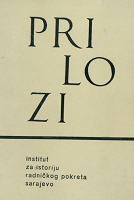MJESTO I ULOGA „HRVATSKOG DRŽAVNOG SABORA” U USTAŠKOJ POLITICI 1942. GODINE
THE PLACE AND ROLE OF THE »HRVATSKI DRŽAVNI SABOR« (CROATIAN STATE PARLIAMENT) IN THE USTASHA POLITICAL MANEUVERS OF 1942
Author(s): Mile KonjevićSubject(s): Politics and society, Crowd Psychology: Mass phenomena and political interactions, WW II and following years (1940 - 1949)
Published by: Institut za istoriju
Keywords: Ustasha movement; 1942; politics;
Summary/Abstract: The attempts to build an Ustasha movement in accordance with their general politics of 1942 basically amount to an attempt to identify the Ustasha movement with Croatia in the framework of a counter-revolutionary concept with the expression »totalitarni sustav« (totalitarian system) as the model of the Ustasha variant of nationalsocialism. However, the development of the uprising forced the Ustasha regime to change its tactics and, by various forms of propaganda, small concessions, and certain compromises, to attempt to effect a calming down of the situation, and thus to prevent the allegiance of the Croatian people from going en masse to the people’s liberation movement. In the context of these attempts on the one hand, and of the conditions of break-outs of uprisings on the other hand, the Ustasha regim e came upon the ideal of the establishing of a »Croatian State Parliament« as the highest expression of continuity and legality of its state and of the totalitarianism of the Ustasha movement. Politically the »parliament« represented an organizational framework for unification of proustasha groups, especially from the ranks of the Party of Rights and the Croatian Peasant Party, under Ustasha leadership with the aim of showing supposed strengthening of the Ustasha movement by means of pacification of various Croatian bourgeois structures. Thus the parliament became one of the bearers of the counter-revolutionary function of Ustasha political maneuvers in that it was to save the Ustasha movement from political liquidation, to represent it with a legitim ate factor and, with its authority, to serve as a means against the revolutionary orientation of the Croatian people. Therefore, the Ustasha propaganda glorifying the »Sabor«, as the supposed highest expression and representation of the existence and legality of the Ustasha government and the embodiment of the idea of the Croatian political and historical justification far outdistanced the working domain of the body which was spent in listening to speeches and messages of Ustasha leaders. Its councils, in which there was maintained a working atmosphere, w ere turned into organs of related ministries and eventually into objects of manipulation of certain ministers. Thus the existence of: the »Sabor« was, in spite of the wishes of its protagonists, subject to the political position of the Ustasha. When the attempts fail to turn the Ustasha way into a Croatian national movement, the politically compromised position of the »Sabor« becomes complete, and the need for it as an instrument of such policies disappears. Thus, the attempt to construct the Ustasha movement as a totalitarian organization of the Croatian people ended in failure and contributed to its exposure as an anti-Croatian, counter-revolutionary and fascist organization. Therefore the »Sabor« represented, even for the civic political structures which participated in its work, a completely compromised organization. Finally, it is not necessary to regard this organization as a representative body or as a lawgiving body, but rather as an attempt on the part of the Ustasha movement to appear as the Croatian national movement, to legitimize its self-dubbed attribute of a state, to create a supporting structure on which to build other possible political arrangements for its maintenance, and thus to counteract the strengthening and development of the peoples’ liberation movement and the socialist revolution in Yugoslavia.
Journal: Prilozi
- Issue Year: 1971
- Issue No: 7
- Page Range: 115-135
- Page Count: 21
- Language: Bosnian

